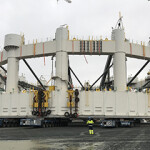PNA to pursue vessel-day scheme for longliners
Leaders of the Parties to the Nauru Agreement (PNA) said last week they will seek to move longline vessels fishing in its waters into a management format currently in place for tuna purse-seiners.
Marshall Islands Marine Resources Authority Director Glen Joseph, who chairs the PNA, which is composed of eight Pacific Island nations that jointly run a zone-based fishery management area, said implementation of a longline vessel day scheme will increase oversight of the fishing industry operating in PNA waters.
“PNA’s management scheme – the VDS – has served us well. We see value in expanding it to longliners,” Joseph said in the PNA’s monthly newsletter. “We recognize it is a different fishery, but it has been left unmanaged for too long.”
The PNA’s VDS for purse-seiners sets a limit on the number of fishing days allowed in the region, requires an independent fisheries observer on board and the collection of detailed catch data, and includes an annual three-month moratorium on the use of fish-aggregating devices (FADs) and in-port transshipment for further monitoring.
Currently, longliners operating in PNA waters are not required to have full observer coverage and do not collect or report adequate data on catch tonnage, bycatch amounts, and transshipment, Joseph said.
“These are the reasons it is urgently needed for the longline industry, particularly on the high seas where there is almost no verification of catches by independent observers or other management systems,” he said.
Joseph said the PNA was beginning the process of seeking support from the Western and Central Pacific Fisheries Commission to implement a VDS for the longliners. Joseph added that the PNA has heard interest from other island nations outside of the PNA who are interested in joining the PNA’s longline management scheme. Furthermore, he dismissed the possibility that the PNA would move to flag state fishing rights in the Western and Central Pacific.
“PNA members agree on the principle of zone-based management,” Joseph said. “Flag state rights are not appropriate or effective as a management tool in the western and central Pacific fishery. The VDS is effective in both conservation and economic development.”
Another reason the group is pushing for a longliner VDS is its economic benefit, PNA Chief Executive Officer Ludwig Kumoru said in the newsletter. Revenue to PNA countries has risen from USD 60 million (EUR 50.7 million) to nearly USD 500 million (EUR 422.7 million) in 2016 as a result of implementing the VDS, he said. Secondary economic benefits have included fishery training, the construction of new airports and air routes, wharfs, and fleet service facilities.
“Domestic development of the fishery is a catalyst for economic development,” Kumoru said.
Kumoru added that one of PNA’s primary goals “is to make sure our people are involved in the fishery, not spectators,” and that the group will pursue efforts to increase the capacity of the local fleet.
“If we have an opportunity to exploit our fishery, we’ll do it,” Kumoru said. “Right now, we license distant-water fishing nations, giving them opportunity to fish in our waters, because coastal states haven’t yet built the capacity to fish. There will come a time when the islands have the capacity to expand fishing in their own zones, and others must be prepared to give way.”
The PNA’s strategy of seeking to grow the domestic commercial tuna fishery may create tensions between the current overseas fleets fishing in PNA waters, “but it’s a matter of survival for the islands,” Joseph said.
“From the increasing revenue, hospitals are being built, roads are being paved, government operations are being funded,” he said. “It’s not about cutting out the distant-water fishing nations. It’s about developing the capacity of our islands to fish our own waters and process the catch.”






Share